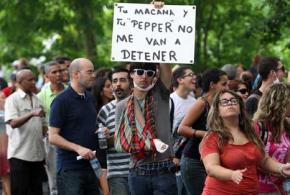Puerto Rico police punish the poor
, of Organizacion Socialista Internacional in Puerto Rico, reports on a protest against police repression.
HUNDREDS OF people gathered in front of police headquarters in the Hato Rey district of San Juan August 25 to denounce the latest case of police brutality in Puerto Rico.
The police violence took place during the early morning hours of August 21, when officers moved in against students and young people gathered on University Avenue. Some of students responded by throwing stones and bottles.
"The riot squad threw scores of tear-gas bombs against the young people, who were not even informed of what was going on," states a press release sent by the General Student Council of the University of Puerto Rico-Río Piedras campus. "Also, there were several arrests that do not appear to have been warranted, and during which detainees were hit with nightsticks and sprayed with pepper gas."
The August 25 picket was organized by the Movimiento al Socialismo (MAS) and was supported by a range of organizations and people from communities like Villas del Sol, where residents recently faced a police attack and are resisting eviction. The mood at the protest was anger--many people new to activism said the police attack was the spark that motivated them to go out and protest.

Government officials claimed the police were cracking down on public drinking. In reality, this is a continuation of the "firm hand" policy (Mano dura) that has been defended by successive governments led by Roselló, Sila Calderon, Aníbal Acevedo Vila, and now President Luis Fortuño.
This policy has been little more than an excuse to punish the poor and working people. The police get to move into poor communities and use brute fore against workers and students organizing to fight for their jobs and their rights.
This police brutality is not the product of some "bad apples" or individuals, as we are led to believe. The government as an institution defends the police every time they commit these abuses. The police claim self-defense, and the case is closed.
The fight against police brutality should not be limited to the physical violence used by police. We should talk about the violent war that Fortuño's government has waged against the poor and workers in Puerto Rico.
After eight months in office, Fortuño has presided over thousands of workers losing their jobs. Last month, the unemployment rate rose to 16.5 percent, and it is expected to increase more even more by the end of the year.
The words of Jaime González, former director of a major tourism project called the Portal of the Future, shows that big business recognizes it has Fortuño's support. At a community forum in the community of Ceiba, González told residents that they shouldn't expect to be able to use the resort unless they "won the lottery." Fortuño was embarrassed enough at the outcry that he fired González from his director position--but the priorities of the tourism project won't change.
The work of police of Puerto Rico is to ensure that such plans are carried out unhindered. The government doesn't care about the real reasons for crime or for a recent increase in suicides in Puerto Rico. That would require them to look beyond the question of public drinking, and recognize the effects of poverty and inequality.
We must expose the true intentions of this government and organize a fight for our right to take to the streets and to defend our jobs and resist layoffs. The police attack on University Avenue was planned by government officials like Fortuño and San Juan Mayor Jorge Santini to target drinking in the streets--but they don't mind people going to a hotel and paying triple the price or more.
This test by the authorities of their power has sparked a resistance, one they didn't expect. We should build on this sentiment and propose real alternatives for the poor and workers.


